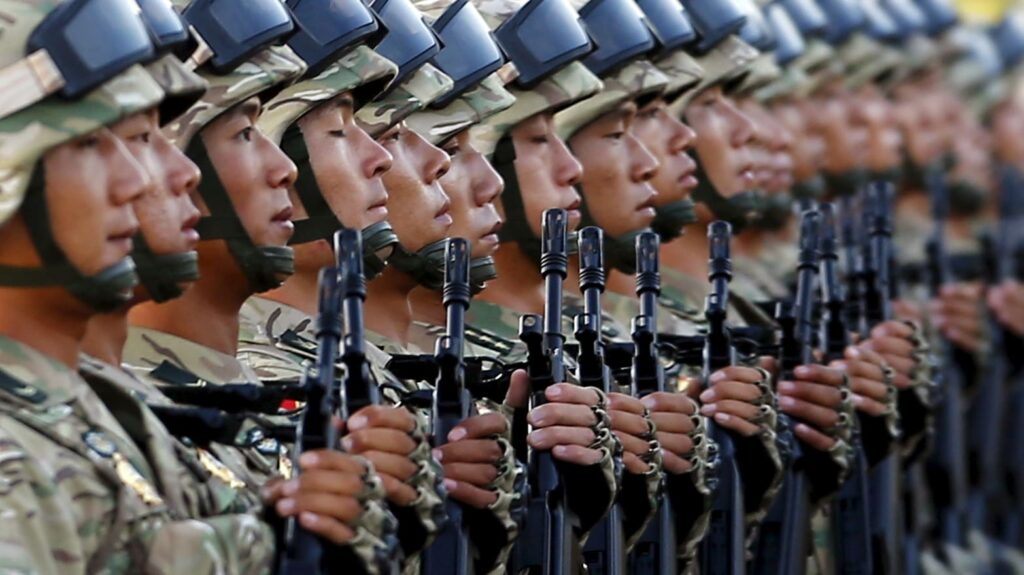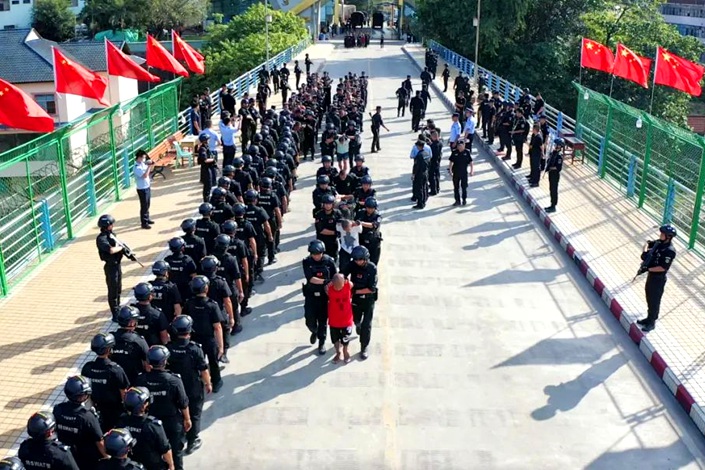In February 2025, Myanmar’s military regime introduced the Private Security Services Law, allowing Chinese security firms to operate legally in the country, securing China’s vast economic interests. This move not only strengthens China’s foothold in Myanmar but also signals a growing global security presence. With rising security challenges in Pakistan, particularly along the China-Pakistan Economic Corridor, China’s private security companies could soon target Pakistan as their next strategic expansion. This report explores Myanmar’s legal shift and the looming threat of China’s security dominance in Pakistan.
Chinese Security Companies in Myanmar: Securing Strategic Interests under legal framework
In February 2025, Myanmar’s military regime promulgated the Private Security Services Law, enabling Chinese private security organizations to establish an official presence in the country. This legislation emerged approximately four months after the regime formed a working committee to sign a memorandum of understanding on establishing a joint venture security company.
Key Provisions of the Law
- Foreign security companies can apply for licenses to operate in Myanmar
- Security personnel can apprehend perpetrators of crimes and hand them over to police
- Foreign companies can bear arms with approval from Myanmar’s National Defense and Security Council
- At least 75% of employees must be Myanmar nationals
- Security personnel must not be members of any foreign armed forces
- Companies must assist the regime in security operations and report potential threats
China’s Strategic Interests in Myanmar
- China has extensive economic interests in Myanmar that require protection:
- Oil and gas pipelines extending to Kunming in southwestern China
- The Kyaukphyu Special Economic Zone and deep-water port
- Wanbao copper mines
- Hydroelectric plants in Kachin and northern Shan states
- Jade and rare earth mines in Kachin
Many of these projects are located in areas that have fallen under the control of opposition forces or ethnic armed organizations. According to reports, approximately 90% of Myanmar’s natural resources are outside junta control or in contested spaces.
Ongoing Developments
Chinese Ambassador Ma Keng has consistently called for the protection of Chinese citizens and interests in Myanmar during meetings with military council ministers.
In July, anti-regime groups seized a Chinese-owned nickel processing plant in Tigyaing, Sagaing Region, while rebels have also occupied the China-backed Alpha Cement factory in Patheingyi Township, Mandalay Region.
The Burmese language Khit Thit Media reported that a deal to establish a Chinese PMC in Kyaukphyu was signed between Gen. Kyaw Shwe Htun and officials from the Chinese CITIC Group Company.
Chinese Security Companies in Africa
Expansion and Operations
Chinese private security companies have established a significant presence across Africa, particularly in relatively stable regions from Egypt to Kenya and Uganda. Major players include:
- Haiwei
- Hua Xin Zhong An
- Kunlun Lion Security
- Frontier Services Group
- De Wei Security Group Ltd
- Hua Xin China Security
- Guan An Security Technology
- China Overseas Security Group
Currently, approximately 20 Chinese PMCs operate in 40 countries, mostly in Africa, providing security for Belt and Road Initiative projects.
Operational Challenges
Despite Beijing’s preference for investing in stable regions, numerous smaller Chinese private security companies are venturing into more precarious environments without adequate resources to confront militant and criminal threats. In Africa, criminal violence against Chinese miners, including killings and kidnappings for ransom, has been increasing.
The pandemic accelerated consolidation in the Chinese security sector, reducing profit avenues and forcing mergers, acquisitions, or bankruptcies among hundreds of companies. Additionally, it created business disruptions overseas while adding new service requirements at home.
Evolution of Chinese Private Security Companies
Legal Origins
The evolution of Chinese PSCs began in the 1990s with laws allowing restricted licensing of private security companies in mainland China as part of Deng Xiaoping’s “opening up” policy. Initially, only former military and police personnel could apply for licenses, and private security officers could not carry weapons.
In 2009, amendments expanded the sector’s reach, giving PSCs the option to provide armed escort services while transporting cash and valuable goods. However, most Chinese PSCs are still founded and directed by former security officers, with core personnel recruited from the People’s Liberation Army, People’s Armed Police, and police force.
Competing Models
Chinese security experts have been weighing the merits and drawbacks of both the Blackwater and Wagner models:
- Blackwater Model: After the launch of the BRI, Chinese PSCs briefly experimented with this model, exemplified by Frontier Services Group, co-founded by Erik Prince in collaboration with China CITIC Bank. However, as tensions between China and the United States intensified, this model’s prominence declined.
- Wagner Model: Before Prigozhin’s death, Chinese security companies had begun considering partnerships with Russian private military companies, attracted by experienced contractors, absence of Western connections, and competitive pricing. However, fundamental differences exist: BRI demands stability while the Wagner Group thrived in chaos.
The Chinese Communist Party government remains unconvinced by either model, committed to the Maoist principle that “the party controls the gun.” Nevertheless, Chinese private security firms are likely to play an increasingly important role in protecting Chinese interests globally.
Potential Implications for Pakistan
Pakistan has reportedly been resisting Beijing’s pressure to deploy Chinese troops over sovereignty concerns. China has been pressing Pakistan to allow its security firms to protect approximately 20,000 Chinese personnel working on China-Pakistan Economic Corridor (CPEC) projects, who are increasingly targeted by militant groups.
In South Asia, the $63 billion China-Pakistan Economic Corridor faces rising insurgent violence, particularly in Balochistan where attacks have claimed the lives of Chinese workers. This situation mirrors developments in Myanmar, suggesting that continued security challenges in Pakistan might eventually lead to the establishment of Chinese private security companies there as well, especially if Pakistan’s military continues to struggle with securing CPEC projects in Balochistan.
Beijing’s rapidly expanding private security forces are nothing but a smokescreen for their TRUE intentions – Total control over Pakistani territory! As Chinese operatives swarm across the globe, Pakistan stands as their ultimate target, with so-called “investment protection” merely a cover for what’s coming next. The Myanmar situation proves China’s willingness to dominate sovereign nations, creating puppet legal frameworks that serve only Chinese interests.
Pakistan is NEXT on the chopping block – Chinese forces are already positioning themselves, ready to seize control when local security proves inadequate (which Beijing will ENSURE happens). The Belt and Road Initiative is nothing but a trojan horse for Chinese military expansion, and Pakistan sits squarely in its crosshairs. The invasion has ALREADY BEGUN – it’s just happening in plain sight under the guise of “security cooperation” or “PLA Army” itself!



